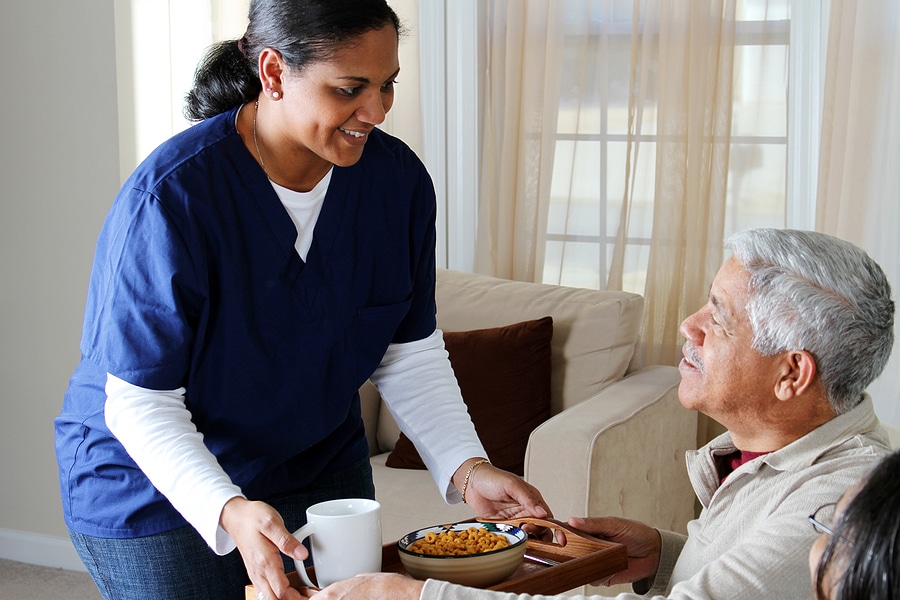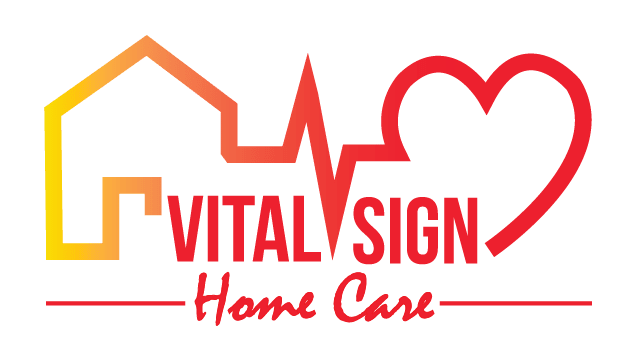Vital Sign Home Care in Maryland. After Stroke Care at Home.
There’s no doubt that strokes are life-changing for millions of elderly Americans each year. When the blood supply is blocked from the brain, the brain cells begin to die, which causes serious physical side effects. Elderly adults who survive a stroke are looking at months and even years to recover just some of their physical abilities.
Family caregivers that want their aging loved one to be comfortable, safe and healthy while recovering at home from their stroke often turn to home care providers like Vital Sign Home Care for help.
How Serious Are Strokes?
Considered a medical emergency even in its mildest form, strokes have a lasting effect on a person’s body. After-effects include muscle weakness, partial paralysis, reduced vision, fatigue, incontinence, poor balance, speech problems, memory problems and chronic pain.
Mild strokes may not cause permanent physical damage and most of the senior’s abilities may be recovered after months of therapy.
Moderate to severe strokes leave permanent changes, although many abilities can be regained or adapted to with physical therapy and occupational therapy.
Loss of Independence in Many Cases
Because of the physical limitations of the body and mind after a stroke, elderly adults cannot live independently as they once did. They won’t be able to take care of their daily needs or run their house so that it is sanitary and safe.
Family caregivers should step in and do what they can, but other responsibilities would mean that the aging adult is home by themselves a lot. Not only is this a detriment to recovery, it can also be dangerous to their health and wellness.
You have questions and we have answers, contact us today and one of our Vital Sign Home Care staff members will contact you shortly.
Vital Sign Home Care provides exceptional Home Care for Stroke Survivors in Anne Arundel County, Baltimore City, Baltimore County, Carroll County, Harford County, Howard County Maryland.

Hiring Home Care Services After a Stroke
With in-home care, aging adults can be cared for in their own home by professionals who are trained to assist seniors. The in-home care providers like Vital Sign Home Care, assist with daily self-care tasks such as bathing and showering safely.
Seniors who need help with getting dressed find that it is faster and easier with help from an elderly care provider. For those who need assistance with grooming and toileting, it is more hygienic to get help from an elderly care provider.
Not only will aging adults need help in taking care of themselves, their home needs to be a safe and comfortable place for them to recover. Senior home care providers can do light housework and help with laundry to keep things clean and tidy. They can also do meal preparation, medication reminders and the occasional errand to help the senior out. Above all, the elderly care provider becomes a companion to the aging adult, preventing loneliness and isolation.
Long-Term Care Options
There’s no such thing as a fast recovery from a stroke. Even the best cases usually take several months to achieve small results. Knowing that stroke recovery will require lots of in-home care, it makes sense for family caregivers to hire senior home care to help seniors recover at home. With hard work and a good support system, aging adults can make good progress in their recovery efforts after a stroke.
How Does Home Care Help Stroke Survivors?

Help With Personal Care and Toileting
Help with Meals, Prepare Snacks, and Get Drinks
Your senior may not be able to cook meals. He or she might be able to shop for groceries if they have someone available to drive them to the store and accompany them as they shop. They may struggle to chop ingredients, lift pots and pans, and clean the kitchen.
Your senior will benefit from a senior in-home caregiver to cook meals, prepare snacks, and clean up after. They may need someone to bring her drinks, preferably in a cup with a straw, and help them eat.
Help with Driving to Appointments and Events
After a stroke, your doctors might tell you that your loved one cannot drive. They need to have someone available to drive to medical appointments and run errands.
Help with Housekeeping and Household Chores
Your aging loved one may be able to do small tasks like fold clothes, but perhaps not major housework. An i-home caregiver can vacuum, dust, and tidy up. It’s also helpful to have a caregiver change the sheets and towels.
Going up and down the stairs to the laundry room isn’t going to be easy. Instead, hire senior care aides to wash and dry her towels, clothing, and bed linens. When they’re dry, the caregiver can put them away.
Help with Errands and Groceries
Finally, a caregiver is available to run errands. Tasks like prescription refills, package notices that require someone to pick up a box at the local post office, and grocery pick-ups are helpful for someone after a stroke.
As you better understand your loved one’s needs after her stroke, make sure he or she has the support needed every day.
We love hearing what others say about our medical and non-medical home care services. View our testimonials and find out why your family should use our services.
How Vital Sign Home Care Can Help After a Stroke
A Person-Centered Care Process
Each agency is unique in its own way. At Vital Sign Home Care, we understand how important it is to plan for care that is person-centered, or in other words, focused on the client’s needs first. As soon as we receive an inquiry about our services, we begin our assessment process. This process involves reviewing personal and medical information that is unique to your loved one’s needs.
This process begins with a:
1. Phone Interview
Our admission coordinator will schedule a time to conduct an initial phone interview to gather as much information about your loved one’s needs as well as the family’s needs. Once this information is gathered, we will then schedule an appointment to meet with one of our RN coordinators to begin the next step.
2. Care Plan Meeting
Our care plan meetings are designed to assess your loved one’s home environment and recommend and plan care based on the information provided. After the care plan meeting, a person-centered plan is developed with the family’s permission. No plan is implemented until the family approves the plan.
3. Caregiver Selection
Our RN coordinator along with our admissions coordinators work together to select caregivers based on the needs and interests of the client and family. This process can be tedious but through. We take into consideration various factors to select the proper caregiver for your loved one. Experience as well as personality is taken into consideration during the selection process with a home visit arranged before the final decision is made.
4. Care Monitoring
Caregivers are required to document (care notes) daily about the day-to-day activities as well as the care provided. Care notes remain on-site at the homes. Our RN monitors the caregivers by doing unscheduled visits.
Our person-centered care process allows our RN coordinators to work closely with our admissions coordinators to select caregivers based on the needs and interests of the client and family. Get Started today!
